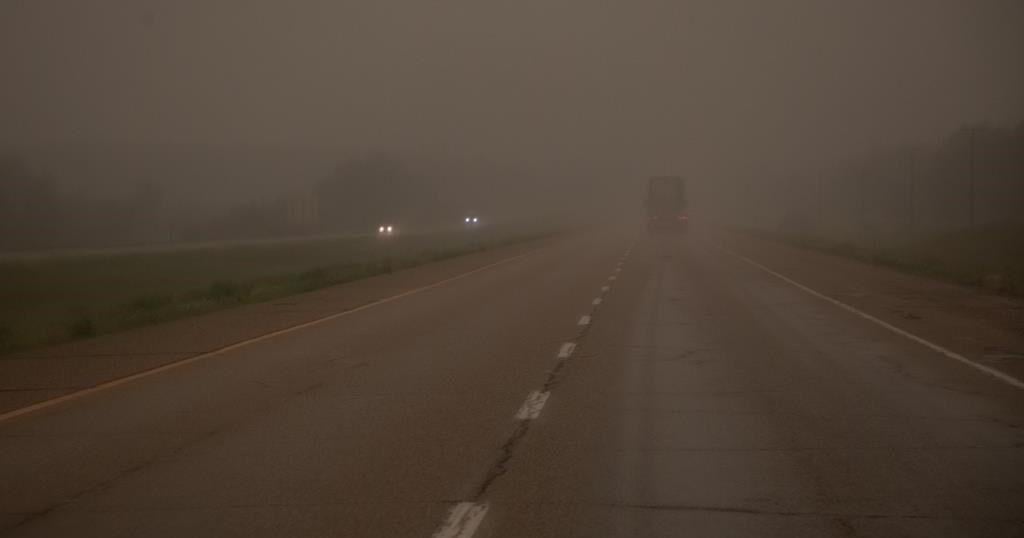As wildfires burn in parts of Canada and the wind carries smoke into communities near and far, health experts are advising people to regularly check air quality ratings and take precautions.
Wildfire smoke contains “particulate matter” — or small particles — that can be harmful when we breathe it in, Dawn Bowdish, a scientific adviser and board member for the Lung Health Foundation, said in an interview on Friday.
“It can compromise the immune cells in our lungs and if it gets into our circulation …those particulates can stimulate inflammatory responses in the heart and the vasculature in the lungs,” said Bowdish, who is also the executive director of the Firestone Institute for Respiratory Health in Hamilton, Ont.
That’s especially dangerous for people with lung conditions such as asthma or chronic obstructive pulmonary disease and can also cause cardiovascular problems, she said.
Dr. Alex Chee, a respirologist and clinical associate professor at the University of Calgary, added that people sometimes don’t realize that air pollution is associated with heart disease, but said studies have correlated high levels of pollution and smog with more heart attacks.
Wildfires that burn through towns — like the ongoing fire in Jasper, Alta. — carry extra pollutants because the smoke is contaminated by burning rubber tires, plastic, metals and petrochemicals, Chee said.
Bowdish said wildfire smoke also contains gases called volatile organic compounds, or VOCs, which “have a number of toxic effects” and are harder to filter out.
“During wildfire season, it’s really important, especially for people with asthma (or) COPD or heart conditions to pay attention to air quality monitors and air quality results because they need to adjust their behaviours,” said Bowdish.
“Otherwise they’re really high risk of being hospitalized for asthma, COPD or these cardiovascular events.”
Chee noted that children, seniors and pregnant women are also at higher risk of bad health effects from poor air quality. For those who are pregnant, the pollutants from wildfire smoke can also affect the fetus, he said.
It’s important for everyone – even those who don’t think they are at high risk – to protect themselves as much as possible from poor air quality, the experts say, noting that outdoor conditions can change from hour to hour.
It’s good for people with chronic conditions to have their own air quality monitors at home to ensure an accurate local reading, Bowdish said. Otherwise, Environment Canada’s air quality index is a good place to turn, she said.
Chee said that when the air quality index has a rating of “high” or “very high” risk, everyone should stay indoors with the windows closed if they can — as long as they’re able to stay cool enough.
Even if the air quality improves to “moderate,” people at higher risk should still try to stay indoors as much as they can, he said.
Environment Canada recommends that higher-risk people “consider reducing or rescheduling strenuous activities outdoors” if they are experiencing symptoms when the air quality risk rating is moderate.
“Moderate risk is not no risk,” Bowdish emphasized.
Ensuring the air inside the home is as clean as possible through filtration is vital, the experts say.
They recommend air purifiers, air conditioners or turning the furnace on to the fan setting.
In all cases, it’s important that the appliances have HEPA filters or filters with a rating of MERV 13.
But both Chee and Bowdish recognize that many people — including vulnerable seniors — don’t have air conditioning, furnaces or air purifiers.
In those cases, they suggest people try to get to air-conditioned spaces such as malls, libraries or cooling centres.
Another option is homemade air filters made of box fans and MERV 13-rated filters, known as a Corsi-Rosenthal box, with instructions available online.
But Bowdish said in the longer term, it’s vital for policymakers to change how homes, cottages and other buildings are constructed so that indoor air quality protection and air conditioning is built in, rather than putting all the responsibility for staying safe from worsening air quality and heat on individuals.
“The climate is going to change and our summers are going to get hotter and hotter and wildfires are going to be more and more common,” she said.
“Putting in rules about building construction so that all — especially vulnerable people who have to live in rental apartments where they may not be able to … make the changes they need — are in safe buildings with air conditioning and with good air (is essential).”
If people need to go outside when air quality is bad, wearing N-95 masks helps filter out some of the harmful particulate matter in wildfire smoke, Bowdish and Chee said.
The Lung Health Foundation also urges people with respiratory conditions to keep their inhalers close by.
The foundation emphasizes that in addition to chronic respiratory conditions, infectious respiratory illnesses – such as COVID-19 or flu – also put people at higher risk when the air quality isn’t good.
This report by The Canadian Press was first published July 26, 2024.
Canadian Press health coverage receives support through a partnership with the Canadian Medical Association. CP is solely responsible for this content.
